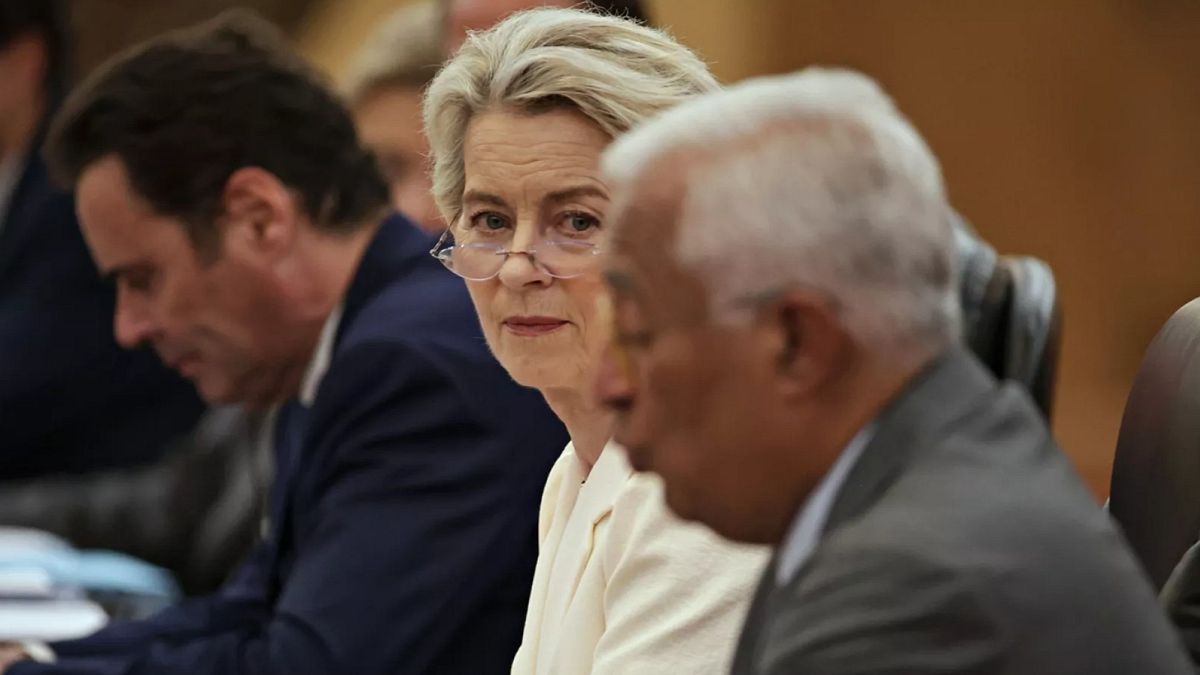The release of the remaining living Israeli hostages held by Hamas on Monday and the cautious start of a ceasefire in Gaza have raised a pressing question in Brussels: should the European Union continue its plans to sanction Israel or abandon them altogether?
The first hints are already emerging.
“Obviously, such measures are proposed in a given context, and if the context changes, that could also eventually lead to the change of the proposal,” Paula Pinho, the chief spokesperson of the Commission, said on Monday.
“But we are not there yet.”
Pinho spoke as European leaders, like Germany’s Friedrich Merz, France’s Emmanuel Macron, Italy’s Giorgia Meloni and Spain’s Pedro Sánchez, gathered in Sharm El Sheikh, Egypt, for a peace summit hosted by US President Donald Trump.
The unity and harmony portrayed by Europeans stood in contrast to their vastly diverging views on the brutal two-year war between Israel and Hamas.
Sánchez, for example, was among the first leaders to call for sanctions against Israel. Macron gradually hardened his stance and led a global campaign to recognise the state of Palestine. Merz and Meloni, by contrast, refused to follow suit.
The tide, though, kept turning: in May, a coalition of 17 member states came together to demand a review of the EU-Israel Association Agreement for possible breaches of human rights. The audit later found there were “indications” of such violations, most notably the curbs on humanitarian assistance that prompted widespread famine.
Israel reacted furiously to the findings, claiming they reflected a “total misunderstanding” of its fight against Hamas. In a recent interview with Euronews, Israeli Prime Minister Benjamin Netanyahu said the EU had become “irrelevant”.
Caught amidst the political scuffle was Ursula von der Leyen, the president of the European Commission, who came under mounting pressure to take decisive action against the humanitarian catastrophe unravelling in the Gaza Strip.
Her shift was cemented in September when she delivered her hour-long State of the EU address before the European Parliament in Strasbourg.
“What is happening in Gaza is unacceptable. And because Europe must lead the way. just as it has done before,” she told MEPs.
She then presented three measures: the partial suspension of the EU-Israel Association Agreement to reimpose tariffs on 37% of Israeli exports to the bloc, which is subject to a qualified majority vote, sanctions against two far-right ministers of Israel, Itamar Ben-Gvir and Bezalel Smotrich, and violent settlers in the West Bank, subject to unanimity, and the freezing of bilateral aid, except for Yad Vashem’s World Holocaust Remembrance Centre and other civil society projects, which would be immediately applicable.
Wait and see
Since von der Leyen delivered her headline-making speech, member states have been scrambling to put together the necessary votes to turn the proposals into reality.
The partial suspension of the Association Agreement has been a particular point of contention because it could lead to tangible changes in economic relations.
From the outset, Hungary and the Czech Republic, two staunch supporters of Israel, made it clear they would not back the trade measures. This left the key in the hands of Germany and Italy, two big countries that could single-handedly tip the balance.
But despite entreaties from other capitals, neither Berlin nor Rome moved, arguing instead that the communication channels with Jerusalem should remain open.
If finding a qualified majority had proven a formidable challenge until now, the start of the peace process could make it insurmountable. Member states have adapted their rhetoric to throw their weight behind Trump’s mediation and turn over a new page.
“This day is a start: when healing can begin and a step taken on the path to peace in the Middle East,” Merz said on Monday before travelling to Sharm El Sheikh.
Technically speaking, all the proposals, including a previous attempt to curb Israel’s participation in the Horizon programme, remain on the table. But the European Commission, as the originator, has the prerogative to withdraw them at any point.
For now, the executive is in a wait-and-see mode.
“We want to see the next stage of the plan implemented by both parties,” Pinho, the Commission spokesperson, told reporters. “And on this basis, we’ll see if there is a need to reassess or not the proposals that we have put forward.”
Pinho did not specify what circumstances might be enough to trigger the withdrawal, but noted the measures had been designed as a “means to precisely bring forward and achieve a ceasefire”, which is now effectively in place.
The fate of the proposals could be decided as soon as next week, when foreign affairs ministers meet to discuss the latest developments. The gathering will be followed by a one-day summit of EU leaders, with the Middle East high on the agenda.
While some member states might prefer to drop the plans and move on, others might urge caution because the peace process has just begun and things could still spiral.
The Commission is expected to react according to the temperature inside the room. The executive often moves according to political winds: it resisted calls to review the Association Agreement until an undeniable majority of 17 countries was reached.
Read the full article here


